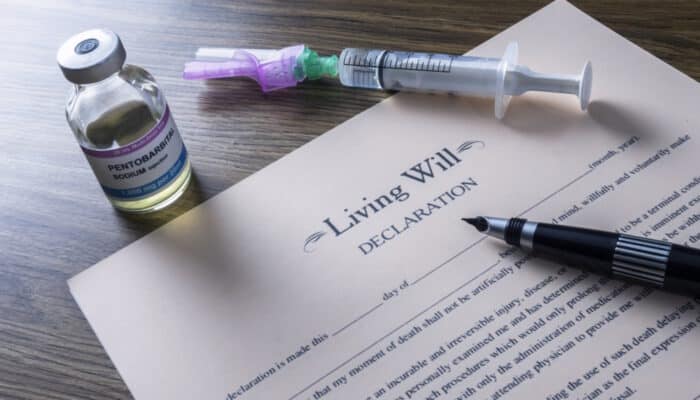An Advance Directive, also sometimes known as a Living Will, is a legal document which details a person’s predetermined wishes about end-of-life care. Advance Directives are highly encouraged to everyone as a means to make difficult decisions regarding one’s care in the event of a catastrophic injury such as severe brain trauma resulting in coma or vegetative state. These decisions should not be left up to family members who are already suffering and might be unsure of that individual’s wishes. Such directives help to avoid disputes as to how to proceed regarding one’s end-of-life medical treatment.
Advance Directives allow these critical decisions to be made in advance by the individual. Under Florida law, a Living Will must be signed by its maker in the presence of two (2) witnesses, at least one of whom is neither the spouse nor a blood relative of the maker. If the maker is physically unable to sign the Living Will, one of the witnesses can sign in the presence and at the direction of the maker.
Unlike the Living Will, however, an Advance Directive is not limited to terminal illness. It may also include medical events such as dementia, stroke, or coma. There are many different types of Advance Directives, including, but not limited to, a Living Will, Health Care Surrogate or medical power of attorney and Do Not Resuscitate (DNR) Order.
Technically, through Advance Directives, one can make legally valid decisions about their future medical care. Florida law recognizes two (2) types of Advance Directives: 1) A Living Will Declaration. 2) A Designation of Health Care Surrogate.
A Living Will is a legally binding document which expresses an individual’s end-of-life preferences, such as whether that person wants to be kept alive through artificial life-support means or equipment.
A Living Will is the written statement that would say that a person may want a Do Not Resuscitate Order. The Do Not Resuscitate Order, on the other hand, is a physician’s order for medical professionals to not provide CPR to the subject person, usually done on a yellow form. A Florida Do Not Resuscitate Order form (DNR or DNRO) is a document or instrument which is used by residents of Florida who suffer from incurable or irreversible medical conditions. This form states that the requester does not wish to be resuscitated in case of respiratory or cardiac arrest. A physician must sign off on a DNR order. A DNR must be honored in any healthcare setting by all medical personnel, including EMTs and paramedics outside of a medical facility. For a Florida DNR to be legally valid or effective, the form must be printed on yellow paper before it is completed by the patient/authorized representative and physician. A blank yellow form can be obtained for free by writing to the Florida Department of Health. Once a doctor writes a DNR order at the patient’s request, no one can override it, including family members. If the said patient changes their mind about the DNR, however, they can always speak to their doctor and have it revoked.
Anatomical donation is a document that indicates an individual’s wish to donate, at death, all or part of their body. This can be an organ and tissue donation to persons in need, or donation of their body for training of healthcare workers. One can write down their choice to be an organ donor by designating it on their driver’s license or state identification card, signing a uniform donor form, or expressing one’s wish in a Living Will.
Although some Living Wills may contain directives regarding organ donations or autopsies which remain in effect briefly after one’s death, any authority granted by a Living Will terminates or ends when the person passes away.
Although an Advance Directive may ultimately decide whether an individual continues to live with artificial life support or passes away, there are many other details that make up a Living Will. An Advance Directive should provide instruction for specific scenarios such as the use of specialized equipment including breathing machines, feeding via tube, what to do in the event of ceased breathing or heartbeat, and others. Advance Directives may also serve to name an individual to hold durable power over attorney to make these important decisions. A skilled and knowledgeable attorney can provide guidance about creating Living Wills and Advance Directives.
Proper planning for the future is one of the most responsible things a Florida resident can do. It will lessen the burden on family members and loved ones in the event of a catastrophic injury that leaves the victim unable to make decisions regarding their own health, treatment, and maintenance.
The foregoing is just a general and brief overview of the subject of Advance Directives and/or Living Wills, among others, in the state of Florida.
If you have any additional questions regarding the foregoing or have any legal issue or concern, please contact the law firm of CASERTA & SPIRITI in Miami Lakes, Florida.

